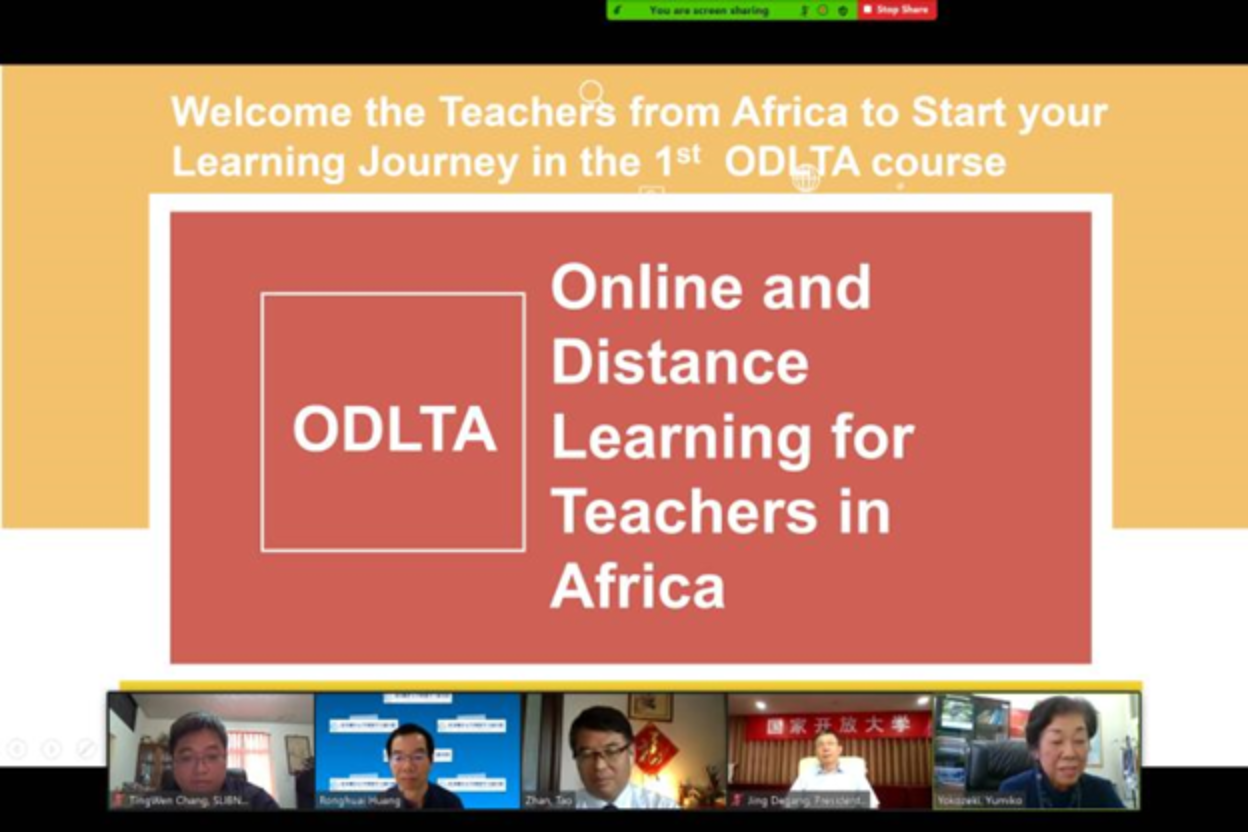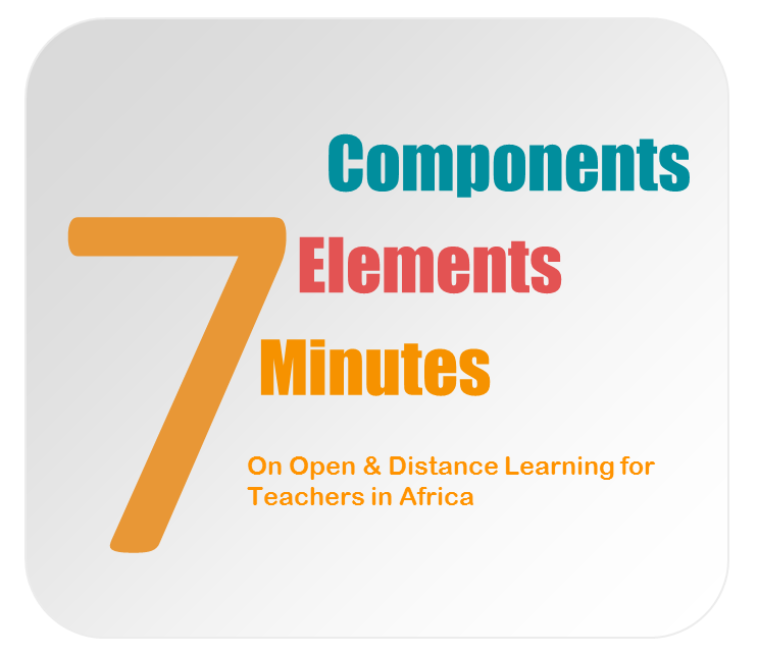Launching of Online and Distance Learning Course for African Teachers (ODLTA)
The COVID-19 epidemic has plunged the world into an unprecedented health, economic and social crisis. According to UNESCO statistics in April, the epidemic has affected more than 1.5 billion students in more than 190 countries. About half of the students do not have access to suitable learning environments and opportunities. Particularly in sub-Saharan Africa, where 53 out of 55 African Union member states have decided to close schools, the entire education system is facing major threats such as dropouts, poor teaching quality and poor learning outcomes. Teachers, as key players in the education system, feel unprecedented pressure when confronted with distance learning.
To alleviate the pressure on teachers, the UNESCO International Institute for Capacity Building in Africa (IICBA), the Institute for Information Technologies in Education (IITE), in collaboration with the International Research and Training Centre for Rural Education (INRULED) designed and developed the Africa Online and Distance Learning for Teachers for Teachers in Africa (ODLTA), to help African teachers master distance learning assessment techniques and methods through the international concept of distance education and case study adapted to the African region, using existing equipment and facilities to conduct distance learning activity. This course is also supported by Smart Learning Institute of Beijing Normal University (SLIBNU) and the Open University of China (OUC).
"Online and Distance Learning for Teachers in Africa (ODLTA)" went live at 17:00 GMT+8 on 7 July 2020 (https://odl.bnu.edu.cn/). Smart Learning Institute of Beijing Normal University and the Open University of China made full use of their many years of accumulated experience in distance education, taking the setting of course standard, development of the curriculum, the construction of the curriculum platform, the development and beautification of the curriculum content, and the evaluation of the effect of the curriculum into account. They considered factors such as the Internet environment and African teachers' habit of internet using to ensure that the course makes a real difference. At the beginning of launching webinar, Tao Zhan, Director of UNESCO IITE, given an opening address for this webinar. He mentioned that the background and main objective of the ODLTA course, which is to train the African Teachers in the effective and contextualized use of distance teaching/learning and assessment techniques and approaches.

At the launch of the course, Yumiko Yokozeki, Director of the UNESCO IICBA, explained that the course offers the online course mode, audio mode (audio only), e-book mode (PDF) and textbook mode (PPT), covering issues such as preparation for distance learning, organization and implementation of teaching. At the end of the course, participants receive an ODLTA certificate signed by IICBA, IITE and INRULED. She noted that the internet in Africa is not sufficiently developed and many online teaching methods are not applicable, therefore this course uses simple language and methods, and that the course can be taken in a way that suits the teacher’s situation and preference. The course is currently in English, with French and Portuguese versions to be launched in the near future. This is not only an initiative during the epidemic, but it is also hoped that in the future it will help African teachers to make better use of e-learning and achieve lifelong learning objectives.
Jing Degang, Chairman of the University Council and President of the Open University of China (OUC) spoke about the establishment of overseas OUCs Learning Centre in Zambia and Tanzania, and the strategic partnership with the University of South Africa and the Open University of Botswana. During the epidemic, the OUC worked to support "suspended class, ongoing learning" by distributing online courses to the public with over 200 million hits and engaging in case studies of open educational resources and open educational practices of SLIBNU as a reference for pandemic affected regions. OUC wants to provide online education teacher competency training for African teachers, online education resources for Open University of Africa and is convinced that by strengthening China-Africa cooperation, we will be able to jointly overcome the pandemic and embrace a bright future for education.
Mr Saidou Sireh Jallow, Chief of Education at UNESCO Nairobi Office pointed out that most of the campuses in Africa have been closed due to the pandemic. Teaching methods and teaching time have become more flexible, therefore, teachers need to acquire practical distance learning skills. The course ODLTA has been a great help to African teachers, not only by providing accessible technology, but also by helping some of the backward areas of Africa to improve the efficiency of education so that African countries can progress together.
Huang Ronghuai, Director of the UNESCO INRULED and Director of the SLIBNU proposed a "7-minute learning mode" that is appropriate for the course. The "7-minute learning mode" means that the course consists of 7 components, each learning unit containing 7 elements, and can usually be learned in 7 minutes. To help prepare teachers for online and distance learning, each unit is expected to provide a solution to an authentic problem, which can be understand a basic concept, a straightforward method, a valuable strategy, or a set of available resources. After a unit test, suggestions for further learning will be given. In this way, questions, concepts, methods, strategies, resources, assessment and suggestions make up the 7 elements of learning unit. To understand and master the basic concepts and methods of online and distance learning, a variety of learning experiences are essential for the novice learner, thus the course design includes 7 components: eBook, audio materials, courseware, online course, online discussion forum, remote quiz (Q&A) and automated certificate .

Huang pointed out that for African teachers, regardless of the learning environment they have, they can read e-books like regular books, listen to one-time downloadable audio materials, watch the course on a mobile device, or fully participate in the online courses with other learners, it is also possible to participate in online discussion forums in each module, or to have Q&A and discussions remotely with the course teacher assistants. Finally, after passing one or more times of the final test of the course, a certificate of achievement for that course is automatically obtained. Taking into account the limited receptivity of African teachers, the limitations of the network, and the lack of computers and learning devices, this online course is the "Introduction to Online and Distance Learning" course for beginners, which consists of 14 learning modules and is designed to be obtained a certificate in 2 hours that will allow the organization of the most basic online and distance learning activities.


